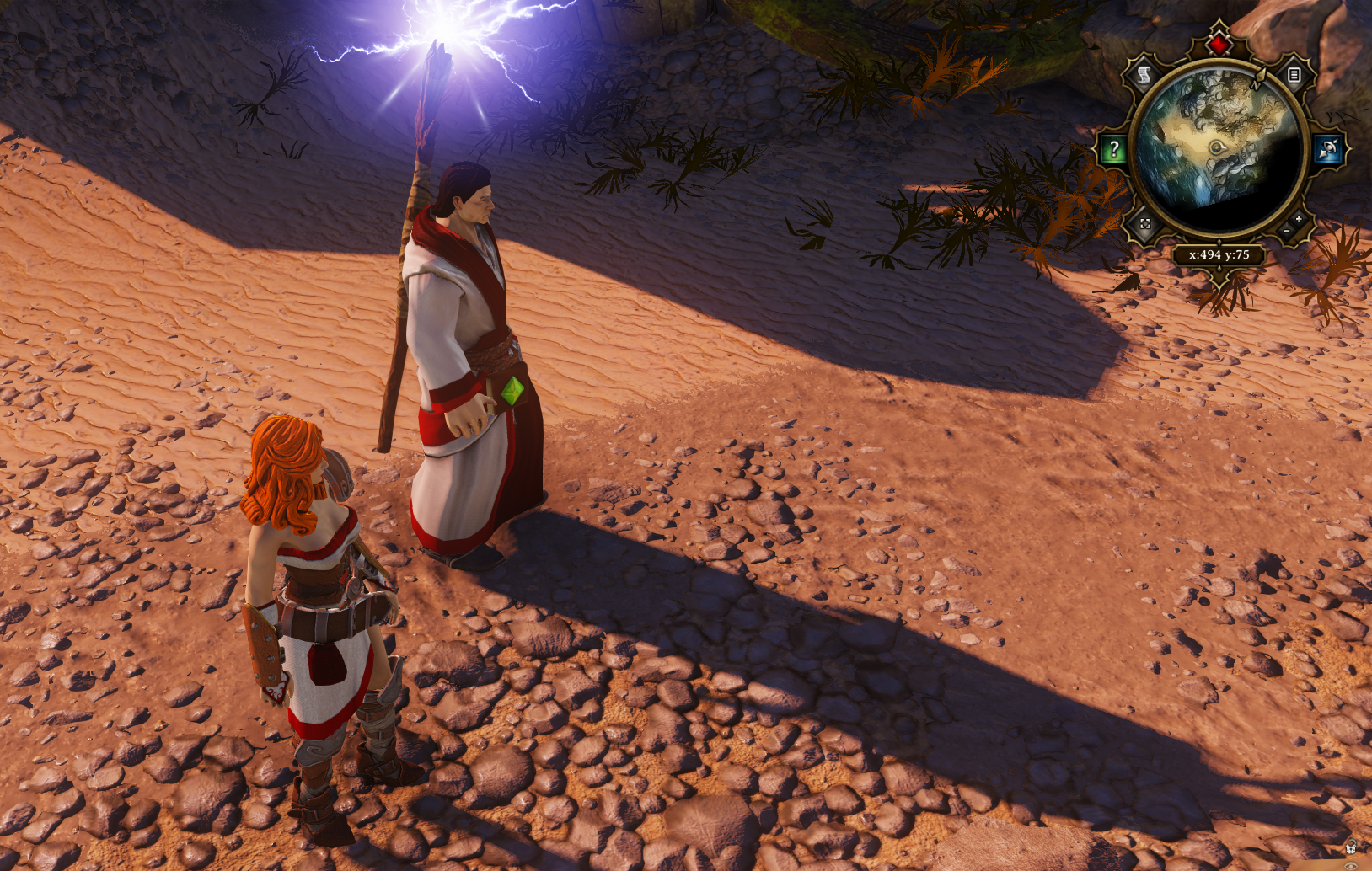Our Verdict
A little obtuse in places, but otherwise this is the best new RPG in years. Demands your time and your brain, but it's worth it.
PC Gamer's got your back
Expect to pay: £30/$40
Release: Out now
Developer: Larian Studios
Publisher: Larian
Multiplayer: Online co-op, 1-2 players
Link: Official site
Blood conducts electricity. Of course it does. My supposedly single-target lightning spell arcs from mage to skeleton and on to the ground, where it touches the splattered byproduct of the ongoing melee. From there it reaches my rogue, my warrior, my archer. My entire party is electrocuted in a single moment's miscalculation, and I learn another hard lesson about Divinity: Original Sin's commitment to its own brand of realism.
It's one of those "well, shit" moments that tell you everything you need to know about a game's designers. When you explore Larian's crowdfunded old-school RPG you're exploring a network of interesting, intricate creative decisions that comment on the genre's past and sketch out a new map for its future. That this is a throwback to Baldur's Gate and Ultima means more than the isometric camera, the fiddly menus, the sharp difficulty curve. It's about the freedom you're given to chart your own course through the campaign, freedom enhanced—and sometimes swiftly curtailed, as per my blood-lightning accident—by a sprawling set of readable, consistently-implemented rules.
Very early in the game your party reaches the city of Cyseal. There's shouting in the harbour. Choose to investigate and you'll see a group of dockworkers crowded around a burning barque, struggling to contain the blaze. This is a quest, but nobody tells you what to do. If you happen to have water magic to hand you can summon a raincloud to douse the flames, earning you a healthy experience boost and increasing your reputation in the town. The problem and its solution are presented to you without the hand-holding you might be used to. It's a liberating feeling, even when its implementation is this simple.
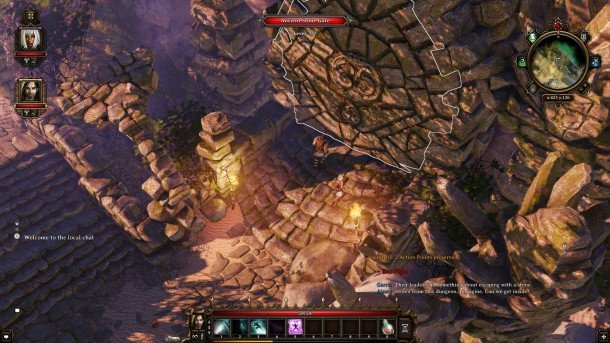
I've become accustomed to RPGs that lock away combat and magic within their own part of the game. I'm used to the idea that a fireball won't work unless it's aimed at an enemy, or that every environmental hazard will be placed such that I'm guaranteed to be able to get past it. I'm used to the idea that some characters can be killed and some can't, that some obstacles are destructible and others are 'just furniture'. Divinity shrugs off those assumptions. Combat might be turn-based when you're fighting an enemy, but there's nothing stopping you from waving your sword around in the middle of town. Fling a fireball at some innocent barrels and you'll start a fresh fire of your own, and this time the locals won't be applauding when you rush to put it out.
Your first task is to investigate the murder of local councillor, but how you go about doing this is largely up to you and the kinds of characters you've created. The story bottlenecks around certain key points, but, like a good pen and paper campaign, Larian provide a huge amount of room to experiment. You can kill key characters if you like, or break into their houses and steal their things. This gives you the power to discover plot points ahead of time if you're intrepid enough, and there's something satisfying about feeling like you've placed yourself ahead of the curve with a bit of enterprising sleuthing.
The counterpoint is that this is the first game where I've found myself genuinely stuck in a long time. It can be unforgiving, particularly as combat becomes significantly more difficult only a few hours into the game. Without clear directions, it's easy to find yourself playing the same battles over and over again without realising that you're marching in the wrong direction. Likewise, the freedom you're afforded to build your characters at the beginning means its easy to waste a couple of hours on a fledgling adventuring party that you subsequently fall out of love with. I had to restart a few times before I felt comfortable with my selection of classes and abilities, something I haven't had to do since Baldur's Gate.
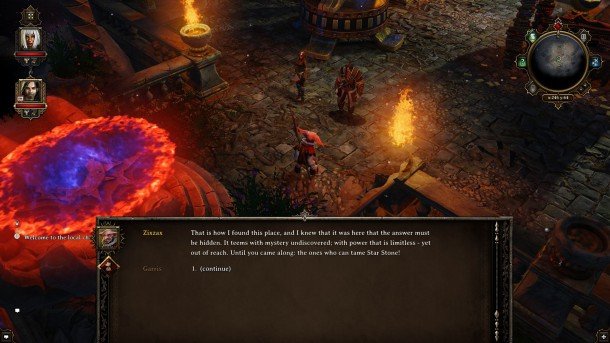
I keep saying 'characters', and that's because Divinity: Original Sin doesn't have a single protagonist—it has two, and you create both of them when you begin the game. You can choose any arrangement of gender and class that you wish, and during key dialogues you pick separate speech options for each character. This establishes the relationship between the two, which can be hostile or cooperative, even romantic. Your choices affect certain plot points and sometimes provide stat boosts, but are otherwise there to encourage you to roleplay.
When your characters disagree—or when you fall out with your partner in online co-op—you pick who wins the argument by playing rock-paper-scissors against yourself. When my archer was invited to join a creepy female-only cult by an imprisoned wizard, she refused. My rogue suggested that this might be a way to get access to the wizard's knowledge and resources and won the subsequent argument. The archer begrudgingly signed up for cult membership, and the characters liked each other less. A strange moment, as the person controlling both, but a story point that felt specific to me and my campaign.
The narrative is standard fantasy stuff, enlivened by Larian's knowing sense of humour and lively writing. Your characters are Source Hunters in pursuit of evil magic users called, er, Sourcerers, and that pun sets the bar for how seriously any of it should be taken. There are some really standout bits of dialogue, much of it hidden away. If neither of your characters have the 'Pet Pal' perk, for example, you'll miss out on being able to talk to animals—including at least one brilliantly-written dog, and rats scurrying in every dungeon that offer clues and the odd bit of philosophical perspective. Sporadic voice acting adds life and variety but leaves serious bitemarks in the scenery. That said, one bellowing cheese merchant in Cyseal hawks his wares with such character that I'd probably buy a wheel from him in real life.
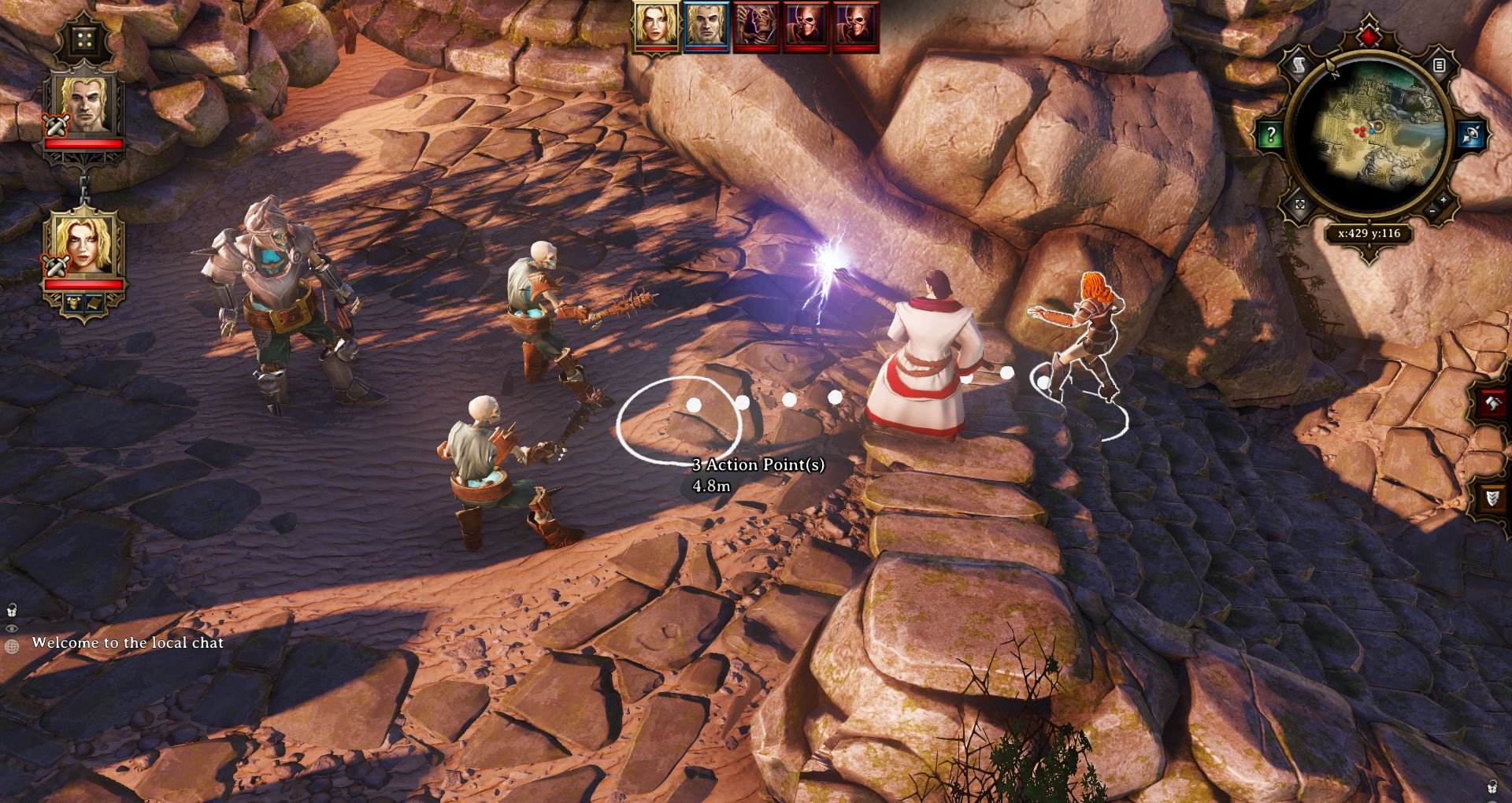
The tone of the game reminds me, more than anything else, of the pen and paper campaigns I've played—particularly how even serious moments tend to get undermined by the players and their sense of humour. At its best, Divinity feels like sitting down to play D&D with its writers. The weakness to this approach is that it's unlikely to stick with you like Planescape Torment or Baldur's Gate II, and you're equally unlikely to fall in love with the setting over the course of the hundred hours you spend in it.
You should also expect to make unsteady progress in your first five to ten hours. The game is slow to provide geographical variety and slower to explain many key game systems. It can be fiddly and obtuse about simple things like trading and arranging each character's inventories, stuff that can hoover up your playtime if you're not careful. Another pass at the UI would have helped here, and is still possible given the game's active ongoing development.
Once you crack the surface, though, Divinity's combat system alone is enough to sustain long sessions. Every battle feels substantially different, a turn based strategy puzzle that challenges you to twist the terrain to your advantage. This might mean creating a chokepoint with crates or igniting poison gas with a fireball. It might mean using special arrowheads to disable particular enemies or beginning battles with an ambush from stealth. The RPG trinity of healers, damage dealers and tanks is represented, but you're forced out of your comfort zone regularly. When your tank is standing in a pool of fresh blood, electrocuting the skeleton next to them might not be the best idea—as I learned to my cost.
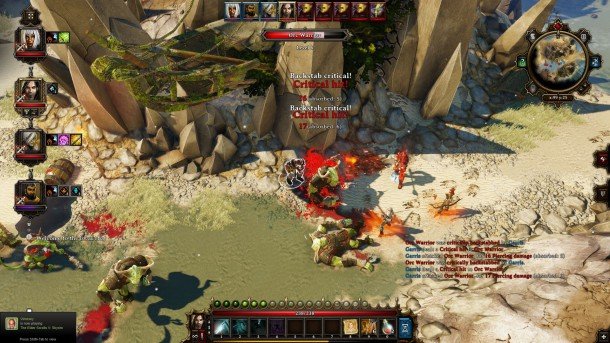
One of the reasons the game is difficult is that enemies have access to the same abilities and items as you do. In most games, you know everything about a foe after the first time you fight them. Here, you have to be ready for potions, special arrows, healing spells, and so on, and for the most part these are used intelligently. You can sometimes back the AI into a corner with a well-placed environmental effect, like burning oil, but Divinity is generally good at providing you with the sense that you're fighting a living foe.
One of the joys of playing Divinity: Original Sin is rediscovering things that RPGs used to do well and eventually lost—creating new experiences in an old mould. That's the nostalgic sentiment that drove it to success on Kickstarter. But what's really exciting about the game is that it proves that traditional RPGs have a lot to teach present-day designers. Freedom, simulation, depth, and respect for the player's choices. There's power in that old blood.
A little obtuse in places, but otherwise this is the best new RPG in years. Demands your time and your brain, but it's worth it.
Joining in 2011, Chris made his start with PC Gamer turning beautiful trees into magazines, first as a writer and later as deputy editor. Once PCG's reluctant MMO champion , his discovery of Dota 2 in 2012 led him to much darker, stranger places. In 2015, Chris became the editor of PC Gamer Pro, overseeing our online coverage of competitive gaming and esports. He left in 2017, and can be now found making games and recording the Crate & Crowbar podcast.
